- Home
- Regan Walker
A Secret Scottish Christmas (Agents of the Crown Book 4) Page 4
A Secret Scottish Christmas (Agents of the Crown Book 4) Read online
Page 4
’Tis the same face.
They were different in appearance from their other brothers. All the Powell men had dark hair, but the twins’ hair was curlier and more streaked by the sun. Their eyes were hazel, rimmed with green and pierced with shards of gold.
Each the identical image of the other.
Which one had appeared to her? And why? The second sight the Ramsay women possessed could often be vague, but the elusive images were always significant, portenders of the future, harbingers of danger, or both.
It had been a dream that warned her of Will’s capture by the French and another that gave her hope for his release. The dream she treasured most had given her the design of a schooner she hoped one day to see built in Arbroath.
“Come with me, Ailie,” Emily urged as she hurried toward the countess’ cook, who had been patiently waiting to one side. “I’m about to introduce Mrs. Platt to Martha. Since Mrs. Banks is occupied with our guests and the new maids, I may need your help to smooth ruffled feathers.”
“I am happy to help if I can.” She followed her sister-in-law and the English cook to the large kitchen at the back of the house. Beyond the kitchen garden was the orangery William had added.
With a trembling voice, Mrs. Platt said to Emily, “I understand my presence in your cook’s kitchen may be unwelcome, my lady, but Lady Claremont thought I could assist with the Christmas dinner.”
“And you shall,” Emily assured her, linking the cook’s arm with her own. “It just might take a bit of persuading.” Glancing at Ailie, she added, “I’ve asked my sister-in-law to come with us. Our cook likes her.”
Ailie mentally prepared herself for the encounter with Martha McBride. In her late thirties, Martha was a good cook but cantankerous as the day was long. In the kitchen, she reigned supreme, supervising assistants and scullery maids. Martha had no love for the English, much less an English cook who might ken more than she did about cooking for the Stephen household.
It had taken years for Ailie to gain the woman’s trust. Emily, on the other hand, had been accorded the respect due the master’s wife when she arrived. Even so, when Emily had suggested a few English dishes be served, Martha had been reluctant to agree. She only acceded to her new mistress’ requests when Emily enlarged the kitchen garden and later began growing herbs and vegetables in the orangery.
Emily let go of Mrs. Platt’s arm to enter the kitchen first. “Martha,” she addressed the cook, who was facing away from them, stirring the contents of a pot over the hearth fire.
Two kitchen maids, busy chopping vegetables, looked up from their work.
Save for the orangery, on a cold winter’s day the kitchen was the warmest room in the house, the fire kept going at all times and the stove nearly so. Ailie could often be found there in afternoons pinching a freshly baked tart.
The cook turned, tucking stray dark hairs into her mobcap as she faced her mistress. “Aye, Mistress?”
“Martha, I want you to meet someone.” Emily stepped cautiously toward the cook, as one might approach a dog known to bite. “Do you remember me telling you that, along with our friends from London, Lady Claremont would be bringing her cook?”
“Aye.” Martha slowly nodded as if trying to postpone the inevitable. Turning to one of her assistants, she gestured to the pot she’d been stirring and, wiping her hands on her apron, walked toward them.
“Well, she is here,” said Emily. “Ailie and I want you to meet Mrs. Platt, who has sailed from London at Lady Claremont’s request to help with the Christmas feast. I asked that she bring her recipes and all she would need. The crew should bring the crate in soon.”
Ailie held her breath, waiting to see if Martha would object. The scrutinizing gaze Martha gave Mrs. Platt did not bespeak a welcome.
Emily made the introductions. To support her, Ailie chimed in, “Everyone is looking forward to the traditional English feast.”
Martha’s face took on a surprised expression. She knew Ailie didn’t give a whit about the English observance of Christmas, but Ailie paid her no mind. She remembered William’s reminder that the English were their invited guests. In Scotland, hospitality was everything.
Undaunted, Emily faced the cook. “Mr. Stephen and I enjoyed our Christmas with some of these same friends last year and he quite liked the roast goose and Christmas pudding.”
Hands on her ample hips, Martha frowned. “What about the dishes the master likes at the holidays?”
Emily smiled sweetly. “Oh, we shall have those, too. William tells me there will be cock-a-leekie soup, haggis with tatties, steak pie, roast game and salmon. And the Scottish desserts, too.”
“The master’s favorite treat is cranachan,” put in Martha.
“Yes, well, I look forward to that myself,” said Emily. “You shall preside over the menus as always, Martha, but for the Christmas dinner, I ask you to consult with Mrs. Platt.”
Tension hung in the room like a schoolteacher’s rebuke.
Casting her gaze about the kitchen, Mrs. Platt offered a compliment Ailie thought quite diplomatic. “I can see you run an efficient kitchen, Miss McBride.”
That was certainly true, thought Ailie. On the side of the kitchen opposite the windows looking out on the garden, William had one of the carpenters build cabinets painted a light gray. Open shelves held plates, pans and copperware, everything neatly in its place.
Martha smiled despite herself. She did manage well her kingdom.
The smile must have encouraged Mrs. Platt. “It will be my pleasure to assist you in any way I can.” The compliment from an experienced cook years older than Martha could only be termed gracious.
Feathers smoothed, Martha inquired as to whether Mrs. Platt would like to have a chat and stay for tea. Ailie and Emily shared a look of relief.
The kitchen was large enough to accommodate Martha’s invitation. In the center of the room, a long oak worktable with bench seats provided ample room for the servants to dine.
Martha glanced at Emily. “With your permission, Mistress, after our tea, I can show Mrs. Platt to her room.”
“That would be lovely, Martha,” said Emily, pleased. “And would you also have one of the servants take tea and shortbread up to Lady Claremont? She is in the chamber across from Ailie’s.”
“Aye, Mistress. Immediately.”
“Wonderful,” said Emily turning toward Ailie, “Now, I must consult Mrs. Banks about our guests.”
“And I must see to the dogs.”
Chapter 4
Robbie relaxed on his bed, idly watching his brother set out the books he had brought from London, wondering why Nash had done so. “You might have left the books behind. I’m certain William Stephen keeps a good library for Scotland’s long winters.”
“Perhaps, but he may not have these.” Nash turned from his books to face Robbie. “Now that you mention it, we will need William’s library for the times when one of us hies off to the village for news of Kinloch while the other remains behind. How’s your Scottish brogue?”
“Miserable,” returned Robbie. “Yours has always been better.”
“’Tis merely a matter of practice. Tonight might be a good time for you to do just that since we’re in the home of Scots.”
Robbie thought of the voices he had heard since their arrival. “Emily’s speech is as English as our own and William has only a faint brogue. Captain Anderson has a deep accent, but he may not be at dinner. Besides, I’d rather talk to William’s pretty sister even if her brogue is not so pronounced.” He gave Nash a sidelong glance, making a mental note of his brother’s frown at Robbie’s interest in Aileen Stephen.
Hearing no response from Nash, Robbie said, “Are you ready to join the others? We don’t want to be late.”
“Almost ready.” Nash crossed the chamber to the chest at the foot of the bed he had claimed as his. “William told us not to change, but I want to wear a different tailcoat. As you have on a brown one, I’ll wear dark green.”
&nbs
p; “We’ll need to switch coats in the days to come if we’re to assume each other’s identity,” Robbie reminded him. This they had done many times. Coupled with their ability to ape each other’s gestures and expressions, they could be virtually interchangeable.
Nash pulled on the green tailcoat. “Whichever of us is in the village will have to don the locals’ attire.”
“I wonder how Kinloch might be dressed,” Robbie mused. “He’s a gentleman but he’ll not be wearing a gentleman’s clothing, will he?”
Nash straightened his cravat. “I doubt it. Wouldn’t he be more likely to appear as a farmer, a sailor or a fisherman? All are plentiful in Arbroath, I would think.”
They began to descend the stairs just as Aileen Stephen came through the front door, her cheeks rosy from the cold. She let her tartan scarf fall to her shoulders, revealing a bounty of bright red hair. A tempting picture to be sure.
Two great black and tan dogs bounded in after her.
“Why, hello,” said Robbie, giving her one of his sincerest smiles. Beside him, Nash tensed, none too pleased at Robbie’s initiative.
His brother smiled at the girl. “What dogs are these?”
She looked up at them, her dogs wagging their long tails, their paws on the steps sniffing at Robbie’s feet. “Goodness and Mercy, a gift from the Duke of Gordon. He raises them on his estate in Moray to the north.”
Robbie stepped down to the entry hall’s stone floor and patted the head of the closest dog, a friendly sort, then returned his attention to the girl.
Nash alighted from the last stair to scratch one of the dogs behind the ear. “How ever did you come up with those names, Miss Stephen?”
“You may call me Ailie. Most everyone here does. You are Robbie and Nash?”
“I am Robbie and this is my brother, Nash,” said Robbie, gesturing first to himself and then to his twin.
Her beautiful face lifted in a one-sided grin as she glanced between them. “’Twill be difficult telling you apart. As for the names of my dogs, do ye nae ken yer Scriptures?”
Robbie exchanged a look with his brother. Neither, he was certain, had a clue as to her meaning, yet she had spoken in the way of the Scots, intentionally deepening her accent. Perhaps she meant to suggest Englishmen might be ignorant of the Good Book’s teachings.
“The twenty-third Psalm ends,” she recited, “‘Surely goodness and mercy will follow me all the days of my life…’ aye?”
“Clever,” said Nash. “I won’t be forgetting their names any time soon.” From the admiring look Nash gave the girl, Robbie surmised his twin wouldn’t be forgetting her either.
Robbie returned his attention to the large lean dogs he decided were setters, but not the black and white speckled ones he was used to. These two were mostly black with small bits of copper and white trim. “I can scarce see a difference between them.”
Her brows lifted. “This from two brothers who are made from the same mold? Really, ’tis easy to tell them apart. Goodness is the male and Mercy is the female.”
“My brother’s a bit slow,” muttered Nash.
Robbie shot Nash a look of annoyance. “Seems I recall you accusing me of being too fast, Brother.”
Nash coughed into his hand. “I was speaking of understanding just now, not your manner of living.” Then to Ailie, “Please excuse my brother.”
“I always make excuses for English rakes,” she said matter-of-factly.
Robbie sputtered. Beside him, Nash appeared bemused.
“If you’re looking for the others, I believe they are in the parlor. Just there.” She gestured to a set of double doors. “I will join you shortly.”
Robbie watched as she proceeded to a door to the right of the stairs, the dogs following on her heels, as the psalm suggested they would.
He turned toward the parlor. “I believe we have been dismissed.” Then, in a low voice, “Now there’s a tempting armful and, for a green girl, most interesting. A sharp tongue, perhaps, but interesting nonetheless.”
“She’s not one of your ‘women on the town’,” said Nash, looking over his shoulder as Aileen Stephen and her dogs disappeared through the door. “She’s a spirited innocent. I find her… enchanting.”
Ailie eyed the bottom of her dress, soiled from mucking about with the dogs. She hoped the Powell twins had been so interested in her setters they had failed to notice. Ah, well, she would make up for it by looking her best for dinner.
“Rhona, what do you think of this gown?” Ailie held up the blue silk gown she’d taken from the clothes press. It was one of her nicest gowns, one she had worn to visit her parents in Aberdeen to convince them she hadn’t forgotten all they insisted she learn about being a lady.
When Ailie joined Will five years ago, he had insisted she have a lady’s maid. A few years older than Ailie, Rhona came from a well thought of Arbroath family, and her older brother worked as a supervisor in the shipyard. Rhona had become more friend than servant. Ailie valued her opinion.
Rhona’s brown eyes narrowed as she studied the gown. “’Tis a fine choice, Mistress. It reminds me of bluebell flowers. And if ye like, I can arrange yer hair with the sides pinned back.”
“Aye, thank you. I prefer not to wear my hair on top of my head in the winter if I can, unless I’m in Aberdeen where Mother insists I appear the lady.”
Once Ailie had donned the gown, she sat at her dressing table, watching her maid in the mirror deftly arranging her hair. Catching Rhona’s eye, she said, “I saw Mrs. Banks as I was coming up. She says our English guests have settled in well. What do you think of them?”
“They seem easy to please and kind, like the mistress. And, except for the one American, they’re all verra English.”
“How are the new servants managing?”
“The ones yer brother hired for the holidays are mostly young ones from Arbroath. The maids above stairs are near useless for anything but gawking at those twin brothers.”
Ailie could well understand the girls’ fascination with the two men. “Aye, they’re handsome enough. And the countess? How is she?”
Rhona paused, a faint smile on her face. “The young maids are terrified of her, I think. Lady Claremont shooed them out of her chamber when they asked to set out her gowns.”
“I hate to ask, Rhona, but perhaps you’d best be the one to serve her. Would you mind terribly?”
“Nay, I wouldna mind. I am fond of older women of character.”
Ailie thought about Will’s description of the countess. “I haven’t yet had the opportunity to speak with her. Will likes her very much. And she is Emily’s good friend. I wonder how she will get on with Grandfather Ramsay.”
Rhona, put the finishing touches on Ailie’s hair. “They’d be a pair, ’tis certain.”
“Aye. I just hope Grandfather doesn’t tease her unmercifully.”
“Dinna worry. Ye’ll be there and can charm him.” Ailie handed Rhona the pearl necklace with the sapphire pendant and Rhona fastened it around Ailie’s neck.
Ailie centered the sapphire on her chest. “I did meet Mrs. Platt, the countess’ English cook. She handled Martha rather well.”
“That’s a blessing.”
Ailie nodded her agreement. “All we need is Martha in high doh.”
Their eyes met in the mirror and they burst out laughing at the shared thought of the cook all riled up. It would not be a pretty sight.
Ailie took a last look at herself in the mirror. “Won’t Will be surprised to see me dressed as if I were dining with Father in Aberdeen?”
“Aye, and ’twill make Lady Emily happy,” said Rhona, smiling.
Ailie justified her extraordinary measures by reminding herself she was to dine with a marquess, his marchioness, a dowager countess and the daughters of two earls, one of which was her sister-in-law. “Perhaps I should do it more often.”
Lifting her small blue tartan shawl from the bed where Rhona had laid it, she draped it over her shoulders. With a wave to
her maid, she left her chamber, more excited than she had been in months.
Nash counted nine men and women gathered in the spacious parlor when he and Robbie entered. Sadly missing was the redheaded sister of their host.
Two footmen glided among the guests offering them drinks, as the conversations became lively. In one corner, Lady Claremont held court with their hostess and Martin’s wife, Kit.
A footman approached with a tray of drinks. The choice of brandy was an easy one for both he and Robbie.
Nash sipped the fine cognac and glanced about the room. The walls were papered in gold above cream-colored wainscoting. Persian carpets in deep shades of red and blue were strewn about the dark wooden plank floors. Two wing chairs upholstered in gold velvet flanked a huge stone fireplace in which burned a well-tended fire. In addition to other chairs and occasional tables set around the perimeter of the room, there were two sofas and a low oval table between them.
Above the fireplace hung a tall gold-framed mirror lighted by candle sconces on each side.
The elegantly appointed parlor was as fine as any in London, but with a touch of the Scots’ preference for a more comfortable room, where a man could bring his hunting dogs and his guns as well as his guests.
Still, it wasn’t the Scottish drawing room he had expected.
There were no mounted elk heads, no crossed swords and no family crests. Instead, the walls held an array of what appeared to be family portraits. Nash made a mental note to ask Ailie who they were.
In one corner, there was a polished mahogany pianoforte. He wondered if Emily played. William Stephen had attended Cambridge and then married the widow of a knight, who was also the daughter of an earl. Perhaps the room had been decorated with Emily in mind.
“As subtly as I can,” said Robbie, glancing at their host, who was speaking with Ormond, “I’m going to ask William what he knows of the town and the political views of its citizens.”

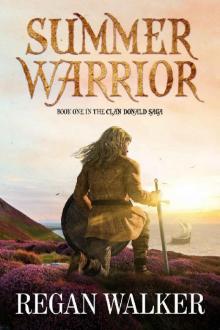 Summer Warrior (The Clan Donald Saga Book 1)
Summer Warrior (The Clan Donald Saga Book 1) Echo in the Wind
Echo in the Wind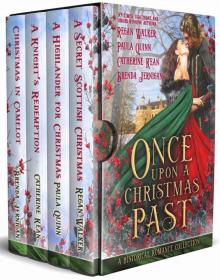 Once Upon a Christmas Past
Once Upon a Christmas Past A Secret Scottish Christmas (Agents of the Crown Book 4)
A Secret Scottish Christmas (Agents of the Crown Book 4) The Holly and the Thistle
The Holly and the Thistle Racing with the Wind (Agents of the Crown)
Racing with the Wind (Agents of the Crown) Wind Raven (Agents of the Crown)
Wind Raven (Agents of the Crown) Rebel Warrior (Medieval Warriors #3)
Rebel Warrior (Medieval Warriors #3) King's Knight (Medieval Warriors Book 4)
King's Knight (Medieval Warriors Book 4)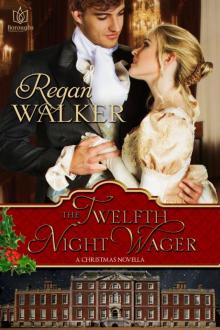 The Twelfth Night Wager
The Twelfth Night Wager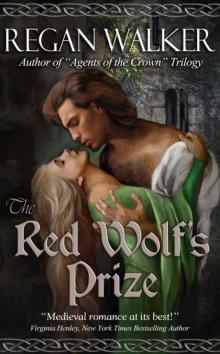 The Red Wolf's Prize
The Red Wolf's Prize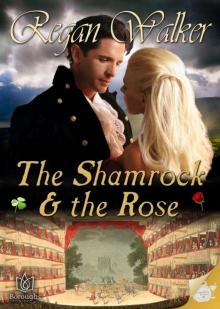 The Shamrock & the Rose
The Shamrock & the Rose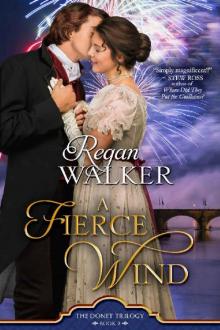 A Fierce Wind (Donet Trilogy Book 3)
A Fierce Wind (Donet Trilogy Book 3) Against the Wind (Agents of the Crown Book 2)
Against the Wind (Agents of the Crown Book 2)